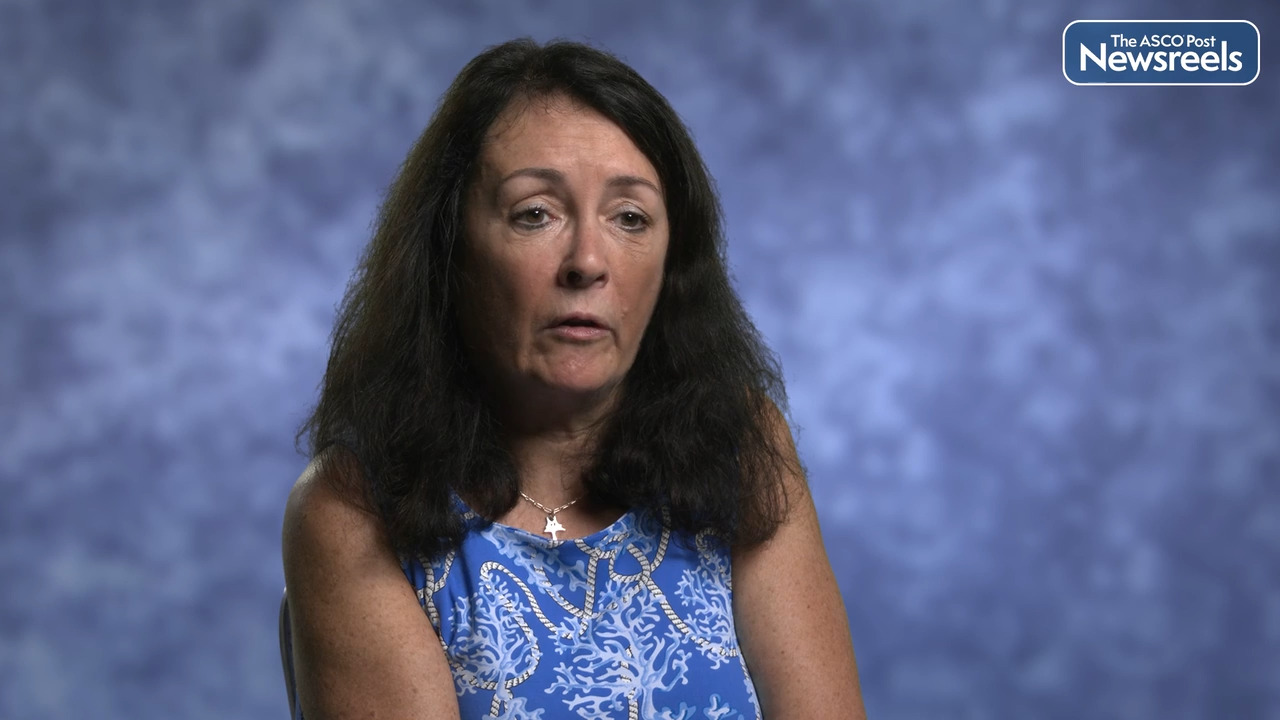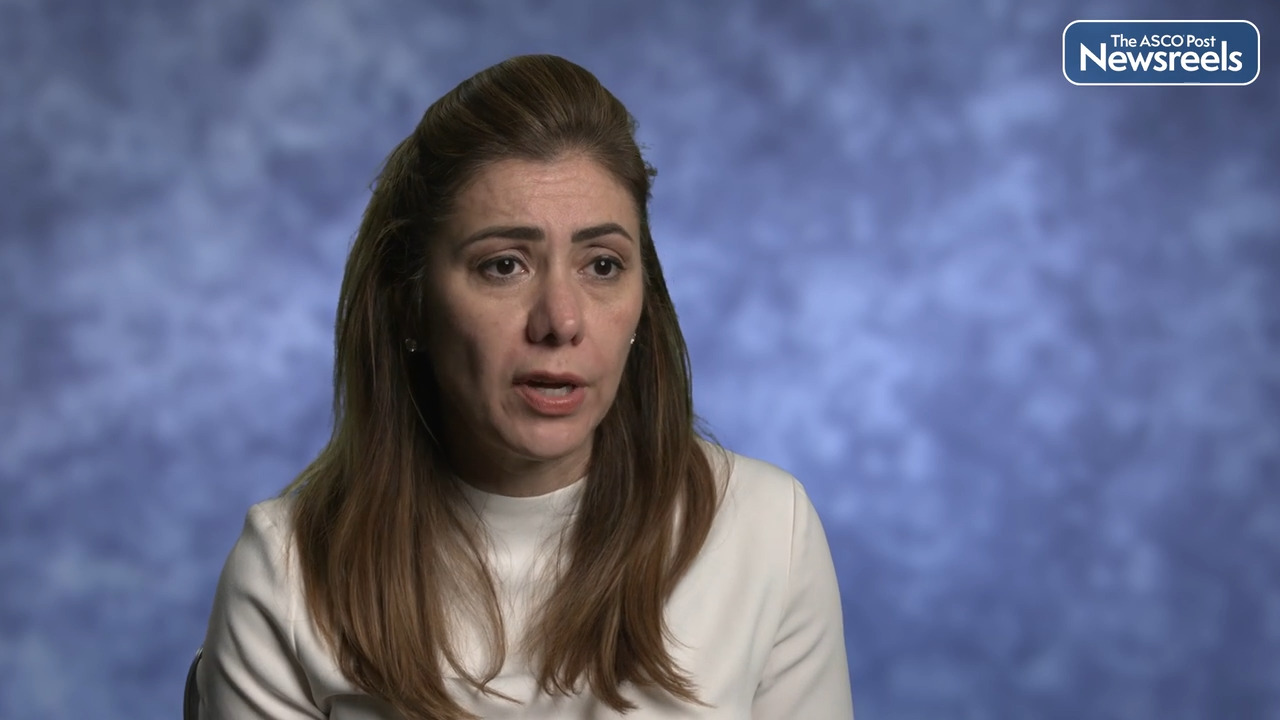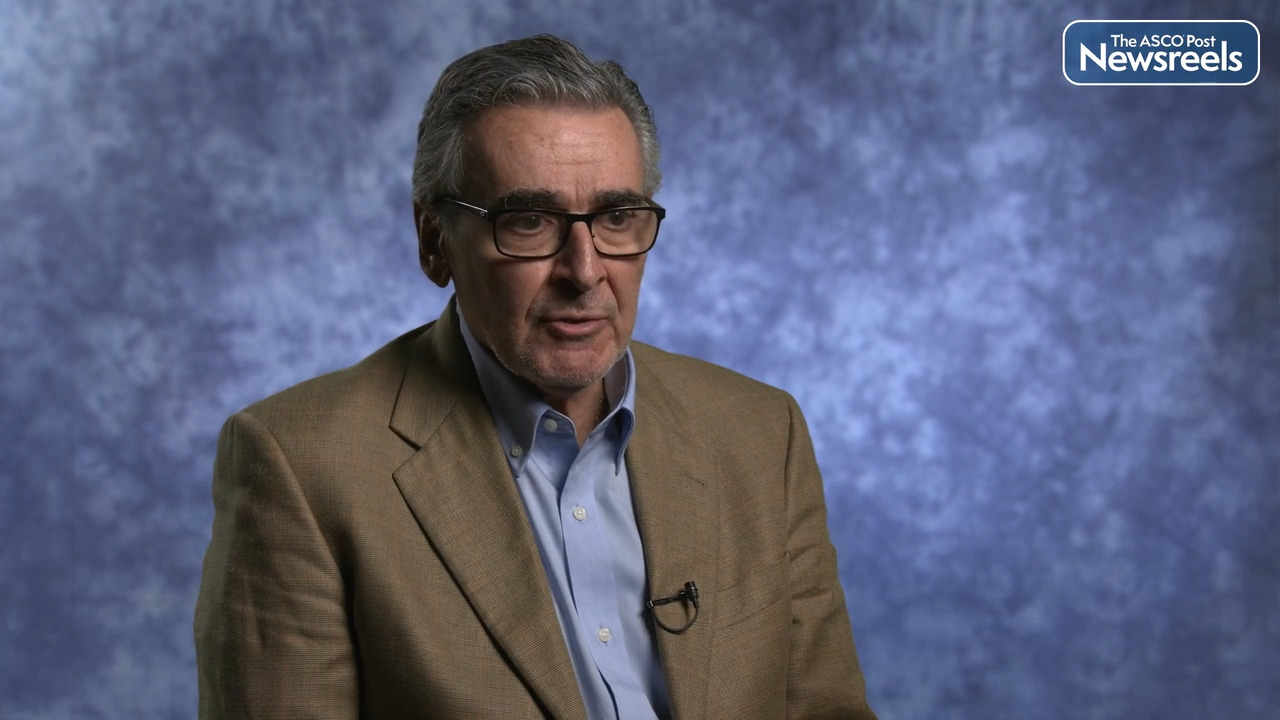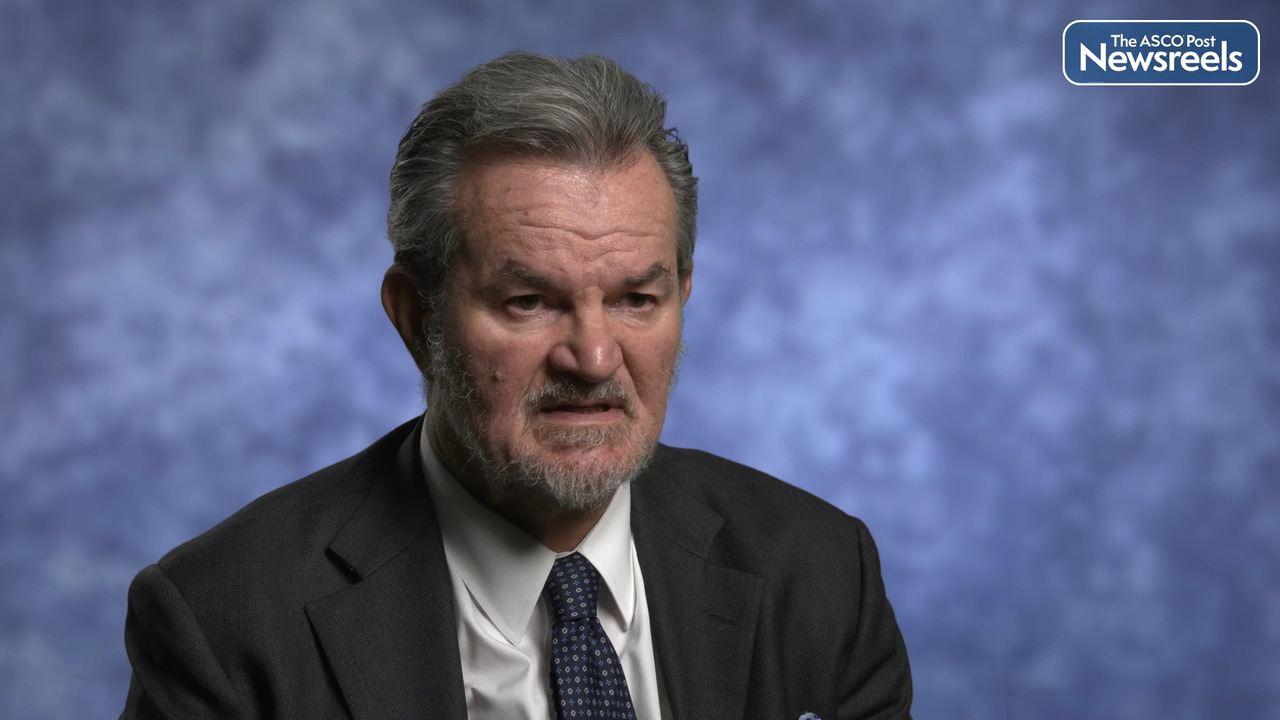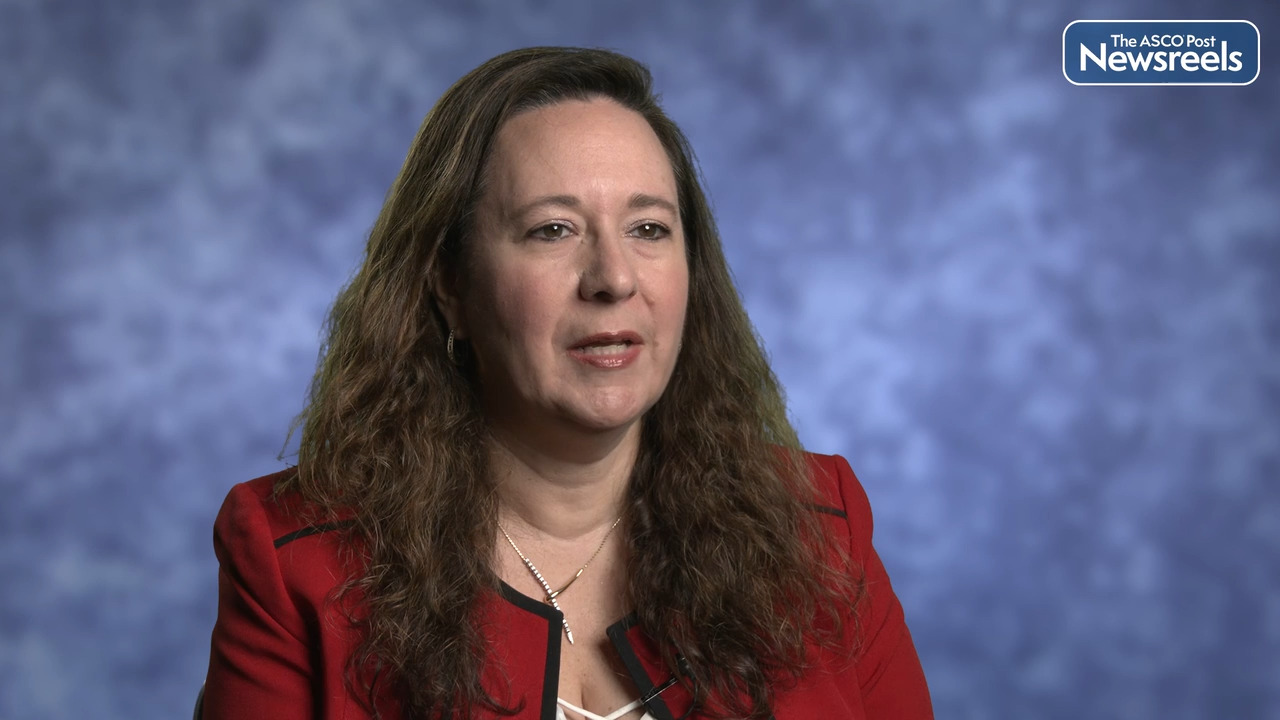Sara A. Hurvitz, MD: New Findings on Neoadjuvant Trastuzumab Deruxtecan and Anastrozole in Early-Stage Breast Cancer
2022 San Antonio Breast Cancer Symposium
Sara A. Hurvitz, MD, of the University of California, Los Angeles, Jonsson Comprehensive Cancer Center, discusses phase II results from the TRIO-US B-12 TALENT study, which showed that patients with localized, hormone receptor–positive, HER2-low breast cancer who are treated with fam-trastuzumab deruxtecan-nxki (T-DXd) in the neoadjuvant setting had an overall response rate (ORR) of 68%. When combined with anastrozole, T-DXd led to a 58% ORR. This is the first trial to evaluate T-DXd in HER2-low breast cancer, a potentially curable disease (Abstract GS2-03).
Transcript
Disclaimer: This video transcript has not been proofread or edited and may contain errors.
The TRIO-US B-12 TALENT Clinical Trial was a study aimed to investigate the activity of TDXD, either alone or in combination with endocrine therapy in hormone receptor positive HER2 low breast cancer in the neoadjuvant or curative setting. So treating patients prior to surgery.
Why is this important? We know that patients with hormone receptor positive breast cancer treated with neoadjuvant therapy have a very low chance of achieving a pathologic complete response, and even a low chance of a good objective response to therapy, even with multi-agent chemotherapy or CDK-46 inhibitors and endocrine therapy we're not getting great outcomes.
TDXD has demonstrated significant benefits in the metastatic hormone receptor positive, HER2 low phase from the Destiny Breast 04 clinical trial, but has not yet been tested in the early stage setting in hormone receptor positive HER2 low disease. So we conducted a very early phase, phase two clinical trial where patients were treated with TDXD alone or with TDXD with anastrozole. Patients had to have stage two or three early stage breast cancer that was ER positive and had to have centrally confirmed HER2 low expression. We evaluated patients and then treated them with six cycles of TDXD, either alone or with anastrozole. And then after we enrolled about half the patients and began to see some near pathologic complete responses, we amended the protocol and extended the length of therapy to eight cycles.
We presented at San Antonio our interim data, very preliminary evidence of activity and our observations of how this drugs or drugs work together in this setting. We showed that there was an objective response rate of 68% with TDXD alone and 58% of TDXD plus endocrine therapy from baseline to the time of surgery. So this is an objective response rate. It's important to note the denominator includes patients who haven't yet completed therapy or who came off therapy early. This objective response rate is somewhat kind of like what we saw in the Destiny Breast 04 clinical trial. We also saw one patient have a pathologic complete response, and we saw an additional four patients have a near pathologic complete response in RCB one. So the data are very intriguing. We are still waiting for surgical results from 24% of the patients treated with TDXD and 31% of the patients treated in the combination arm. So it's too early to call a PATH CR rate. But the data that we got, it's very intriguing.
It's interesting, and it is allowing us to look at the biomarkers, what's happening to HER2? What's happening in the tumor microenvironment as we treat with TDXD, with or without endocrine therapy.
Next year, we plan to report the final results, and I think these results may help inform the design of studies of TDXD in the early stage setting for HER2 low disease.
The ASCO Post Staff
Ruth O’Regan, MD, of the University of Rochester Medical Center, discusses the Breast Cancer Index (BCI), a genomic assay that can assess the risk of late distant recurrence (5–10 years after diagnosis) of hormone receptor–positive, early-stage breast cancer. Among premenopausal women with this disease who were enrolled in the SOFT trial, those with a high BCI score had an increased risk of distant recurrence. Those with a low BCI score benefited more from the addition of ovarian suppression therapy to endocrine therapy after 12 years of follow-up (Abstract GS1-06).
The ASCO Post Staff
Mariana Chavez-MacGregor, MD, MSc, of The University of Texas MD Anderson Cancer Center, discusses phase III results from the SWOG S1207 trial which was designed to evaluate the role of adjuvant everolimus in combination with adjuvant endocrine therapy among patients with high-risk, hormone receptor–positive, HER2-negative early-stage breast cancer. Adding everolimus did not improve invasive disease–free or overall survival and was associated with high rates of adverse events (Abstract GS1-07).
The ASCO Post Staff
Joseph A. Sparano, MD, of the Tisch Cancer Center at Mount Sinai Health System, discusses long-term clinical outcomes data that continue to show many women with early breast cancer can safely forgo chemotherapy, when guided by the 21-gene recurrence score result. The longer follow-up also showed that recurrences of breast cancer continue to occur years after the original diagnosis, although these recurrences were not prevented by chemotherapy use. Racial disparities were not explained by inequities in social determinants of health or treatment adherence, with Black women at higher risk of early recurrence within the first 5 years of diagnosis, but not later recurrence after 5 years (Abstract GS1-05).
The ASCO Post Staff
Andrea De Censi, MD, PhD, of Italy’s E.O. Ospedali Galliera, discusses phase III findings showing that low-dose tamoxifen (so-called babytam) given for 3 years still significantly prevents recurrences from noninvasive breast cancer after a median of 7 years from treatment cessation. Babytam at 5 mg/d for 3 years significantly lowered recurrence from noninvasive breast cancer at 10 years without “excess” adverse events (Abstract GS4-08).
The ASCO Post Staff
Judy C. Boughey, MD, of Mayo Clinic, talks about why breast-conserving therapy may be a treatment option for some patients with multiple breast lesions. For most patients who present with two or three sites of cancer in one breast, mastectomy is recommended. But results from the ACOSOG Z11102 (Alliance) suggest that for women with multiple ipsilateral breast cancer, breast-conserving surgery with adjuvant radiation therapy and lumpectomy site boosts may be beneficial (Abstract GS4-01).
